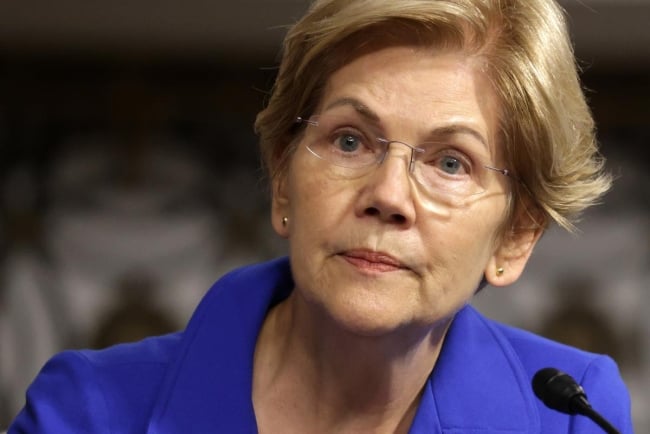You have /5 articles left.
Sign up for a free account or log in.

Senator Elizabeth Warren, a Democrat from Massachusetts
Alex Wong/Getty Images
Senator Elizabeth Warren says that student loan debt, at its core, is an economic equality issue.
That’s why the Massachusetts Democrat sent numerous letters to Secretary of Education Miguel Cardona and President Joe Biden, called out student loan servicers during congressional hearings, and even held up the Senate vote to confirm James Kvaal as under secretary of education.
“Through the decades, the cost of higher ed has increasingly been shifted away from taxpayers and on to families,” Warren told Inside Higher Ed. “Families that can afford to send their kid to college—and that kid can graduate debt-free—have moved their next generation forward faster and further than families that don’t have those resources. It’s that inequality that lies at the heart of it that has pulled me into this debate from the beginning.”
Warren is quick to rattle off the research and data that she believes best tells the story of the inequality that student loan debt can create. One of the studies she highlights is from the Institute on Assets and Social Policy at Brandeis University, which in 2019 found that white borrowers owed about 6 percent of their original loan 20 years after starting college, while Black borrowers still owed 95 percent.
“There’s a profound racial justice issue that lies at the heart of this,” Warren said. “That means racial inequality and wealth inequality that’s already out there is exacerbated through higher ed rather than dampened.”
Part of her passion for this issue stems from her own humble beginnings. Her dad, who was a janitor, and her mom, who worked at the department store Sears, couldn’t afford to send her to college. But she was able to make her postsecondary education happen with a part-time job as a waitress, given that tuition for a semester at the University of Houston was only $50 at the time. Warren says the United States has moved far away from the ideal that it should invest in opportunities for everyone—not just those born into privilege.
But as one of the most vocal senators on issues related to student debt, Warren is hoping to bring that ideal back.
“Student loan debt gives a deep insight into who we are as a country,” Warren said. “We need to make real changes, and we need to make them now.”
The senator has been busy since Biden took office in late January. By early February, she was already leading her congressional colleagues in the charge to get Biden to cancel $50,000 in federal student loan debt via executive action. While Biden himself has expressed skepticism that he has the legal authority to do so—and commissioned an unreleased memo examining that authority—Warren is confident that the debt can be canceled “with the stroke of a pen.” She received her own memo on the subject during her 2020 presidential run, when attorneys at Harvard Law School’s Legal Services Center outlined the legal justification for debt cancellation without congressional action.
Several months later, it was revealed that Kvaal’s nomination to his Department of Education post wasn’t being brought to the Senate floor for a vote because Warren was holding it up. She was waiting for further clarity from the department about how the student loan program would continue to be administered, a person familiar with the situation said at the time. He was later confirmed in September, and Warren told Inside Higher Ed that she’s pleased with the progress the department has made so far.
Specifically, the department has made temporary changes to the Public Service Loan Forgiveness program to allow more borrowers to benefit from the loan forgiveness that the program has promised. It also has made it easier for borrowers with total and permanent disabilities to get their loans discharged, and it has announced stronger oversight of loan servicers.
“They’ve moved in the right direction on Public Service Loan Forgiveness, on debt forgiveness for people with disabilities and on making it clear to loan servicers that they are there to serve students—not just boost their own profits,” Warren said. “We’ve seen a real change over at the Department of Education, and it is welcomed. But it is not enough.”
Last week, Warren continued putting pressure on the administration, this time joining Senate Majority Leader Chuck Schumer, a Democrat from New York, and Representative Ayanna Pressley, a Democrat from Massachusetts, in calling for an extension of the student loan repayment pause that has been in effect since March 2020.
In a letter to Biden, the lawmakers cited a recent analysis by the Roosevelt Institute that showed restarting loan payments in February—as is currently planned—would strip more than $85 billion from 18 million borrowers over the next year.
“The emergence of the Omicron variant is a reminder the virus is still impacting parts of the economy and public health,” the lawmakers wrote. “As the Roosevelt Institute analysis shows, restarting student loan payments will exacerbate the economic challenges facing millions of families.”
Officials made it clear in their August announcement that the repayment pause would not be extended again. But Warren said the department should cancel a big chunk of student loan debt and then move the remaining borrowers into “sensible repayment plans”—before repayments restart and not while the pandemic is still ongoing.
“It’s time to say enough is enough,” Warren said.




